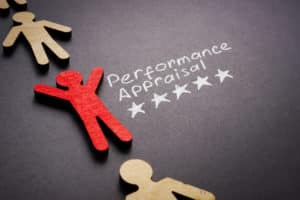As we approach the end of the year, our minds inevitably turn to performance reviews.
These conversations are the perfect opportunity for leaders and their teams to connect and review what’s been achieved, however they are often dreaded or seen as simply another administrative task to be completed.
Forbes HR Council suggests the negative anticipation of these reviews can exacerbate anxiety in both employees and leaders and leads to review meetings being ineffective and a ‘tick the box’ exercise.
We outline five steps to make performance reviews less painful and something your team are motivated to participate in.
1. Build relationships with your team
Strong, constructive relationships with your team are the foundation to building trust and psychological safety. When these are in place, performance reviews are seen as an opportunity to connect, rather than just another task to compete. Finding opportunities to build trust through advice, coaching and feedback regularly embeds a feedback culture where performance conversations are just part of how ‘we do work around here’.
2. Don’t wait for the annual performance review
Nobody likes to be surprised by feedback they weren’t expecting. Providing continuous feedback throughout the year is essential to not only maintaining a constructive relationship but also ensuring that formal reviews are both effective and fair. Ensuring time for regular 1:1 conversations allows for a deeper connection to be created and ensures that formal performance reviews are less daunting. Integrating regular and on the spot feedback – both ways – enables real time corrections and a focus on growth and development. Both leader and employee are more likely to be engaged in an ongoing performance review process, than one that simply occurs twice a year.
3. Create the right environment
When we all worked in the office five days a week (remember those times!) performance reviews were scheduled regularly, either in a meeting room or the leader’s office. In the new hybrid world of work, there’s an opportunity to have performance review conversations, or even regular 1:1’s where and when it will be most effective. You can still have these in the office if that’s what works for both of you, but it might be more productive to have these online, in a coffee shop or even on a run if that’s what works best. Just make sure it’s something that you have discussed and agreed ahead of time, so you both know what to expect.
4. Clarifying Intentions and Expectations
Effective performance conversations occur more than once a year. As a leader, its critical to ensure that clear expectations are set regarding the frequency of conversations and the intent of feedback. For the same effect during performance review meetings, leaders need to be clear on the how feedback will be offered and what they want the key take always to be. Regularly reviewing expectations during performance conversations can ensure alignment, particularly if business objectives have shifted.
5. Consistency and Transparency
A strategy for making performance reviews simple and painless is to be consistent. Discussing goals and progress regularly, every week or every month ensures that both leaders and employees are clear on goals and how performance is being measured. As leaders, being consistent, transparent and fair builds trust and can remove any perceived bias that can sometimes occur during performance review conversations.
While performance conversations can be difficult and are often seen as an administrative HR task, they don’t have to be.
Building strong, constructive relationships, having regular conversations and being clear on your expectations will make your performance review discussions something you look forward to, rather than something you dread.

















